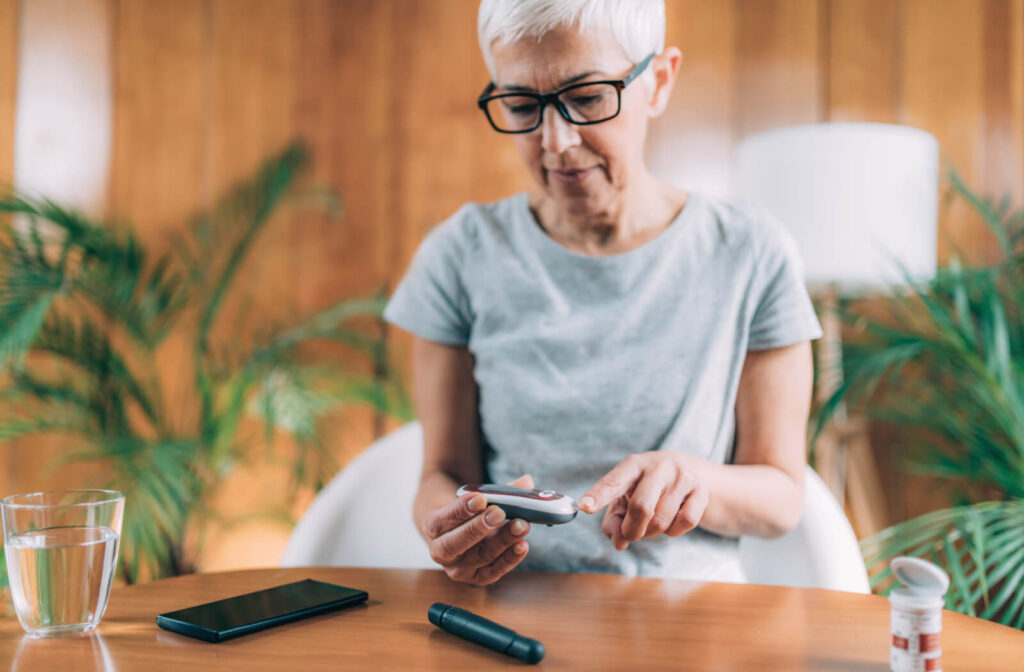When you live with diabetes, you understand that managing your health involves many different aspects, from blood sugar control to lifestyle choices, to eye health concerns like diabetic retinopathy.
It’s natural to ask what you can do to protect your vision and whether diet can play a part in reversing any damage.
The relationship between diet and diabetic retinopathy is complex. While diet can’t reverse the condition, a good diet can help prevent it from progressing further and helps you manage potential complications.
What Is Diabetic Retinopathy?
Diabetic retinopathy is an eye condition that can occur if you have diabetes. It affects the retina, the light-sensing tissue at the back of your eye. Over time, high blood sugar can harm the small blood vessels in the retina, leading to vision problems.
How Diabetes Affects Your Eyes
High blood sugar can cause the blood vessels in your retina to weaken, bulge, or leak fluid. In some cases, new, weaker blood vessels may also develop. These changes can damage the retina and lead to vision loss if not addressed.
Common Vision Changes
In the early stages of diabetic retinopathy, you might not notice any symptoms. However, as the condition progresses, you could experience:
- Blurry vision
- Dark spots or “floaters” that drift in your vision
- Empty or dark areas in your field of view
- Difficulty seeing details
So, Can Diet Reverse the Condition?
Diabetic retinopathy can’t be reversed, and the damage it causes is usually permanent.
However, you can slow down progression and stop this condition from getting worse by managing your diabetes. Diet is an important part of this process.
There are also treatments available to help prevent further damage to your eyes.
The Role of Diet in Eye Health & Diabetes Management
While diet alone may not reverse damage, it’s still a powerful tool for managing blood sugar levels. A balanced eating plan helps support your overall health and your vision and puts you in a better position to protect your sight.
Foods to Support Your Vision
A simple way to plan meals is the Diabetes Plate Method. Fill half your plate with non-starchy vegetables, a quarter with lean protein, and a quarter with carbohydrates. Good options include:
- Non-Starchy Vegetables: Broccoli, peppers, spinach, carrots & mushrooms
- Lean Proteins: Chicken, fish, eggs, tofu & lentils
- Carbohydrates: Brown rice, oats, quinoa & sweet potatoes
What Foods to Avoid When You Have Diabetic Retinopathy?
Some foods can make it harder to manage your blood sugar. It’s a good idea to limit:
- Foods high in salt, like chips & processed meals
- Sweets like candy, cake & ice cream
- Drinks with added sugar, such as soda & some fruit juices
- Fried foods & others high in unhealthy fats
- Refined foods like white bread & white pasta

Can You Stop the Progression of Diabetic Retinopathy?
The main goal is to slow or stop the progression of the condition. You can do this by actively managing your diabetes through a combination of diet, lifestyle changes, and regular medical care. This approach gives you more control over your health.
The Importance of Blood Sugar Control
Consistently high blood sugar is the primary cause of damage to the retinal blood vessels. Keeping your blood sugar and A1C levels within your target range is one of the most effective ways to protect your eyes from further harm.
Lifestyle Habits for Healthier Eyes
Beyond diet, other daily habits contribute to your eye health. For instance, regular physical activity helps manage blood sugar. It’s also important to manage your blood pressure and cholesterol levels, as these can also affect the blood vessels in your eyes.
The Value of Regular Eye Exams
Since diabetic retinopathy often has no early symptoms, regular eye exams are crucial for timely detection. If you need a routine check-up, our team at Total Vision Del mar can help monitor your eye health and detect diseases before they affect your vision.
Medical Treatments for Diabetic Retinopathy
If diabetic retinopathy progresses, effective eye disease diagnosis and management is key. Your eye doctor has several ways to treat complications and protect your sight. These treatments focus on stopping the blood vessels from leaking and reducing swelling in the retina.
Medications & Injections
Certain medications can be injected into the eye to help reduce swelling and stop new, abnormal blood vessels from growing. These are very effective at managing complications. They work by targeting specific factors that contribute to the condition.
Laser Treatments
A laser can be used to seal leaking blood vessels in the retina. This procedure helps reduce swelling and can prevent further vision loss. It is a focused treatment aimed at stabilizing the retina.
Eye Surgery Options
In more advanced cases where there is bleeding or scar tissue in the eye, a surgery called a vitrectomy may be an option. This procedure removes the blood-filled fluid and scar tissue from the eye. It can help restore clearer vision.
A Team Approach to Your Health
Managing diabetic retinopathy requires a team effort. Your diet, medications, and lifestyle choices work together. Following your doctor’s advice and keeping up with your appointments gives you a great opportunity to preserve your vision for years to come.
At Total Vision Del Mar, our team is dedicated to helping you protect your eye health with comprehensive and proactive care. We’re here to answer your questions and support you on your health journey. Schedule your appointment with an eye doctor in San Diego today to create a personalized plan for your vision.



